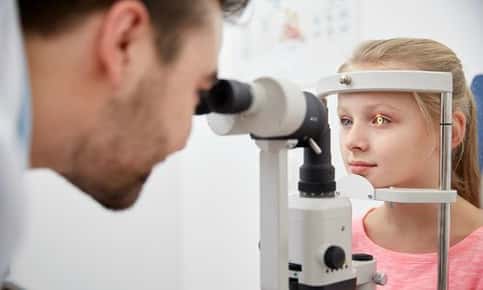
The New Year Is The Perfect Time to Schedule An Eye Exam For Your Child
Academic problems aren't always caused by poor concentration, lack of ability or behavioral issues. Vision problems can affect your child's ability to make good grades, read, pay attention in class or even catch a ball in gym class. Scheduling a comprehensive eye examination for your child will help ensure that they are prepared for the second half of the school year.
How Vision Problems Can Interfere with Learning
It's hard to succeed in school if you can't see well. Children who have vision problems may find it difficult to follow instructions, recall facts, write clearly or perform math problems correctly. Poor vision can even affect behavior. If your child can't see the whiteboard clearly or read the words on a page, they may become bored and find more interesting things to do during class time.
Without good vision, your child's memory can suffer. Poor vision or issues with the brain's ability to process and store visual images can affect their ability to remember the correct spelling of words or the date that the Battle of Hastings was fought.
What Types of Vision Problems Can Affect Children
Childhood vision issues can be caused by:
- Refractive Errors. Objects, words, and images may appear blurry and out of focus if your child is nearsighted, farsighted or has astigmatism.
- Strabismus. Commonly called "crossed eyes," strabismus occurs due to an eye misalignment. Even slight misalignments can affect vision. Strabismus can cause double vision or depth perception issues.
- Amblyopia. If strabismus isn't corrected, your child may develop amblyopia (lazy eye). The condition occurs when the brain receives slightly different input from each eye. Eventually, it turns off the images received from one eye.
- Eye Teaming and Tracking Issues. It's difficult to read or retain information if your eyes don't work well together. Tracking issues can affect a child's ability to follow the words or a page or focus on moving objects.
- Visual Processing and Perception Problems. Issues that affect the brain's ability to process the images it receives can alter your child's ability to recognize and remember letters, numbers, words, and images.
- Convergence Insufficiency. Both of your eyes turn inward slightly when you focus on near objects. If the eyes can't perform this movement easily, images may look blurry or words may appear to jump on the page.
An Eye Exam Can Identify Subtle Vision Problems
Your child may have a vision problem even if they can see every letter or number on the eye chart perfectly. If your child has always had difficulty following the words on a page or copying information from the board, they may assume that everyone else has the same issue. Although eye rubbing, squinting or covering one eye can be signs of a vision problem, some children have significant vision issues yet never display any outward signs.
Reading the eye chart is just one part of a comprehensive eye exam used to assess your child's vision. The exam will also evaluate eye coordination and movement, eye tracking and teaming, focusing ability, visual information processing, peripheral vision and other aspects of good vision.
If a problem is detected, you'll receive information on treatment options from your child's vision therapist. Eyeglasses or contact lenses will help your child see clearly if they are nearsighted or farsighted, but corrective lenses aren't the only solution vision therapists offer. Vision therapists are optometrists who've received extensive training in diagnosing and treating a range of visual deficiencies.
Vision therapy improves the connection between the eyes and the brain and can also help correct eye alignment issues and other problems that affect your child's ability to use his or her vision effectively.
Therapy sessions are designed to make improving vision a pleasant experience. During sessions, your child may attempt to hit a dangling ball with a small bat, play a matching board game or spend a little time mastering a computer game aimed at improving amblyopia symptoms.
Help your child succeed in school this semester by scheduling a comprehensive vision examination. Contact us to make your child an appointment as soon as possible.
Sources:
College of Optometrists in Vision Development: Eye Exams Are Not All the Same
American Optometric Association: Comprehensive Eye and Vision Examination
American Optometric Association: A Look at Reading and Vision

